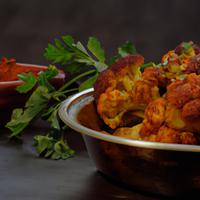
1 serving (150 grams) contains 120 calories, 3.0 grams of protein, 8.0 grams of fat, and 10.0 grams of carbohydrates.

Log this food in SnapCalorie

Nutrition Information
Calories |
190.5 | ||
|---|---|---|---|
% Daily Value* |
|||
| Total Fat | 12.7 g | 16% | |
| Saturated Fat | 1.6 g | 8% | |
| Polyunsaturated Fat | 0 g | ||
| Cholesterol | 0 mg | 0% | |
| Sodium | 476.2 mg | 20% | |
| Total Carbohydrates | 15.9 g | 5% | |
| Dietary Fiber | 6.3 g | 22% | |
| Sugars | 4.8 g | ||
| protein | 4.8 g | 9% | |
| Vitamin D | 0 mcg | 0% | |
| Calcium | 47.6 mg | 3% | |
| Iron | 1.6 mg | 8% | |
| Potassium | 476.2 mg | 10% | |
* Percent Daily Values are based on a 2,000 calorie diet. Your daily values may be higher or lower depending on your calorie needs.
Food Attributes
Source of Calories
About Harissa cauliflower
Harissa Cauliflower is a flavorful dish inspired by North African cuisine, showcasing the bold, smoky, and spicy notes of harissa paste. Typically, cauliflower florets are roasted until tender and caramelized, then coated with a blend of harissa, olive oil, garlic, lemon juice, and spices like cumin and coriander. Packed with vitamins C and K, cauliflower provides key antioxidants and supports overall health. It’s also low in calories and carbohydrates, making it ideal for those seeking nutrient-dense, plant-based options. Olive oil contributes heart-healthy fats, while harissa adds depth without excessive calories. However, individuals mindful of sodium intake may want to check the harissa's salt content, as some versions can be high. Versatile and vibrant, this dish can stand alone as a vegetarian main or serve as a zesty side, celebrating the robust flavors of North African cooking with a nutritious twist.



